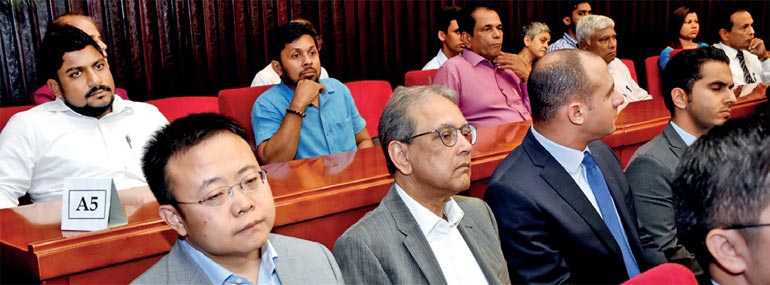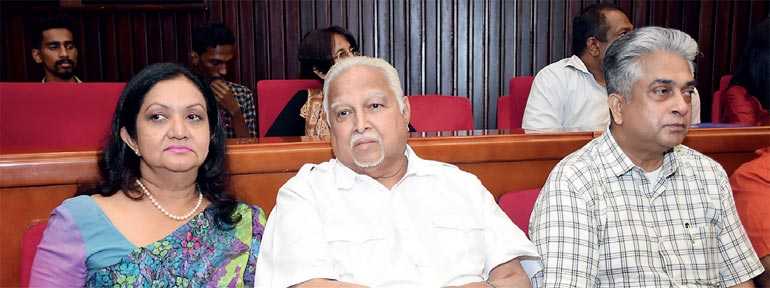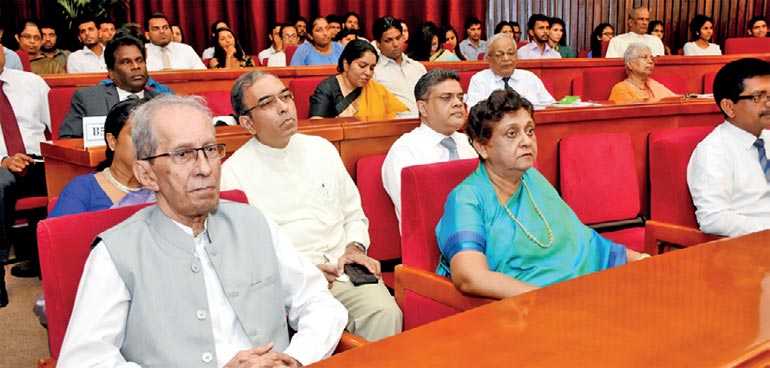Wednesday Feb 18, 2026
Wednesday Feb 18, 2026
Thursday, 19 September 2019 00:16 - - {{hitsCtrl.values.hits}}
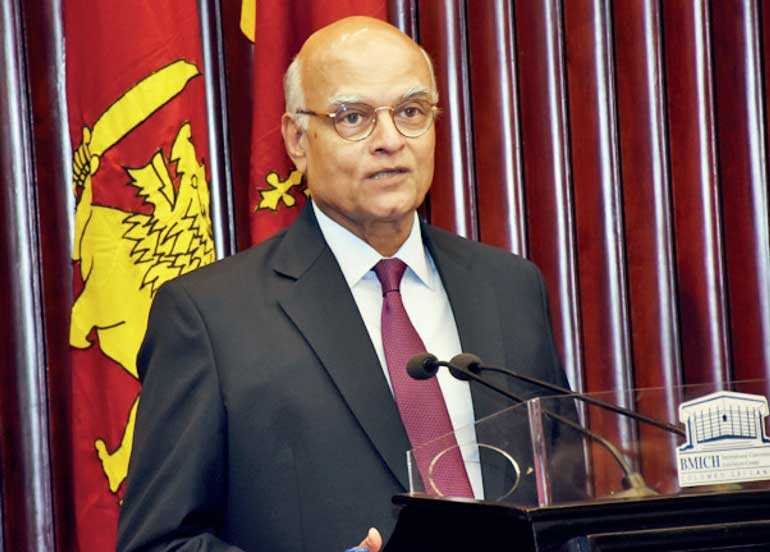
Shivashankar Menon
By Shanika Sriyananda
In the Indian Ocean (IO), it should be possible to build coalitions of the willing to contribute to maritime security, as India, Sri Lanka, the Maldives and now Mauritius and Seychelles have done successfully since 2010 and a similar arrangement for the Bay of Bengal is long overdue, former Indian National Security Advisor and Foreign Secretary Shivshankar Menon said.
Emphasising on the importance of introducing a workable strategy for the IO that would include guarantees of freedom of navigation, maritime security, putting maritime and territorial disputes in the area in abeyance, and positive crisis management and confidence building measures amongst the countries of the area, he said today there was no obvious provider of these public goods in the area as a whole. 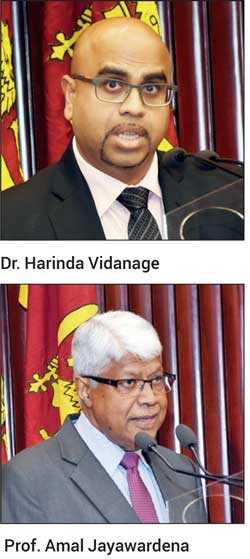
“An effective Indian Ocean strategy requires a corresponding effort on the Asian landmass surrounding it. This is why I prefer the phrase the Indian Ocean world, which includes the ocean itself and the countries that are in or around it,” he said at a ceremony to mark the 60th death anniversary of late Prime Minister S.W.R.D. Bandaranaike recently.
The welcome address was delivered by Bandaranaike Centre for International Studies (BCIS) Council Member Prof. Amal Jayawardena, while BCIS Director Dr. Harinda Vidanage introduced former diplomat Menon, who delivered the Bandaranaike Memorial Oration 2019 on ‘Emerging International Order in the Indian Ocean World’.
The 2019 is a significant year for the Bandaranaike research hub, the BCIS, which celebrates its 45th anniversary. It was inaugurated by late Prime Minister Sirimavo Bandaranaike in memory of her late husband S.W.R.D. Bandaranaike in 1974. Significantly, it is the 100th anniversary of developing international relations as an academic discipline.
SWRD – one of Asia’s greatest sons
Menon said late Premier S.W.R.D. Bandaranaike, who was one of Asia’s greatest sons, had built an independent country which is not afraid to be itself.
“As great power rivalries intensified, the Indian Ocean, which had been an ocean of trade and tranquillity through most of its history, was militarised and began to see the increasing presence of great power warships, submarines and nuclear weapons. India and Sri Lanka were subject to the pulls and pushes of superpower rivalry and great power politics. That we navigated them successfully was thanks to the foreign policy legacy left us by the founders of our modern states like S.W.R.D. Bandaranaike,” Menon said.
He said both India and Sri Lanka, which urged the IO should be a zone of peace and demilitarised, their concerns and efforts on the multilateral negotiation between 1973 and 1982, had to be supported to codify the law of the sea, which ultimately bore fruit in the United Nations Convention on the Law of the Sea (UNCLOS).
Menon, in his comparison of the IO countries during the past and present, said: “Today we again find ourselves in a situation of flux. The Indian Ocean, and Asia in general, is increasingly militarised. The powers that be — not all the same as in the mid-sixties — are pushing us to choose sides in their contention. Old certainties are being upset by technology and economics, and the balance of power shifts again.”
He said geopolitically speaking, the Indian Ocean had an open geography, which had made it a peaceful ocean of trade, migration and travel throughout recorded history. “The geography of the Indian Ocean itself promotes the emergence of multiple powers and balance between them. In this respect the Indian Ocean is different from closed seas like the South China Sea, which can be dominated from the land, by land-based missiles and aircraft, as China has shown by creating land on shoals and reefs to dominate the sea. Its open geography has had an abiding influence on the peaceful nature of the order in the Indian Ocean world,” he explained.According to Menon, the globalisation decades from the eighties onwards only enhanced the significance of the Indian Ocean both to the world economy and as a stage for great power contention.
“Globalisation itself was empowering new actors whose interest in the Indian Ocean was reflected in their diplomacy, their naval presence and their political search for influence in the Indian Ocean littoral. China and India were the principal beneficiaries of the globalisation decades, but not the only ones. South Korea, Indonesia, Vietnam, and others grew rapidly, and they all invested in their naval capabilities. Asian waters became a crowded and critical space, and disputed jurisdictions in the South China and East China seas acquired a new edge,” he said, adding that economic growth itself has enhanced Asian countries’ interest in the seas around them.
He also said the Indian Ocean, which carries over 93% of India’s trade, had become very important to India, as did the security of its sea-lanes and the stability of their partners in the littoral.
Menon said China, which went through an evolution as a result of her reform and open door policies after 1978, was no longer a self-sufficient continental economy and her prosperity was now tied to the world, on which China was depending for energy, commodities, markets, technology and food.
“China, therefore, seeks to make the transition to becoming a maritime power, building a powerful navy and asserting her claims in the seas around her. This too is a first in her long history,” he said.
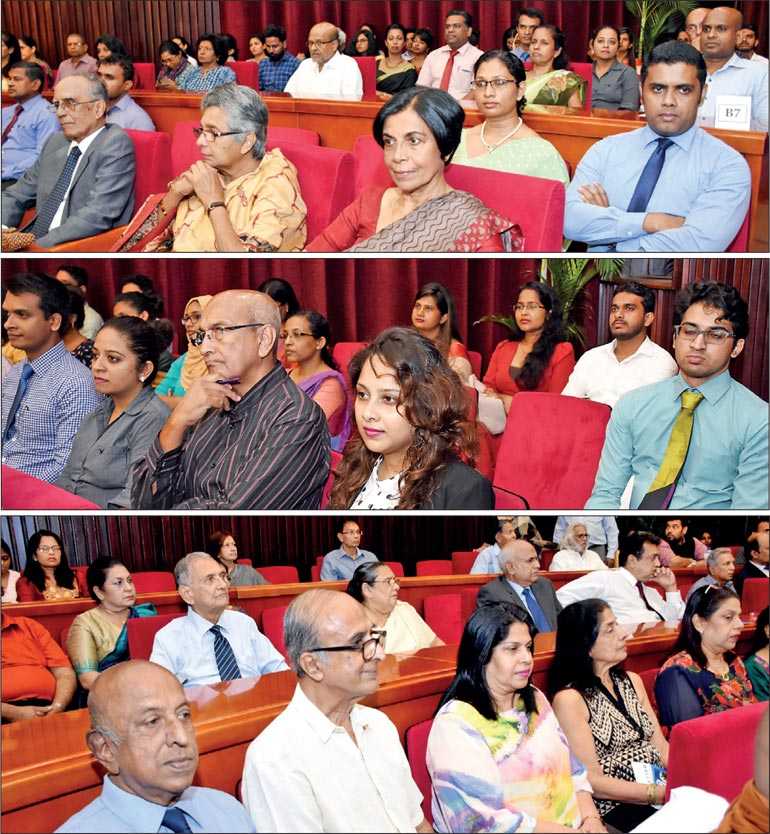
IO – centre-stage for global politics
He said the IO had become the centre-stage again for global politics and the economy and the redistribution of global power in an Asian century was most evident.
“The ocean carries more than 100,000 ships every year, about half the world’s container traffic, one-third of the world’s bulk cargo, and three-fifths of its oil supplies. The fibre optic cables that carry the world’s data, the new oil, are also undersea, with an estimated two-thirds of data flowing through Indian Ocean cables. The countries of Asia are among the most economically dynamic in the world, and accounted for over 60% of the growth in the world economy last year,” he said, adding that most global supply chains also pass through Asia, India and China.
Menon said India, China, Japan and Korea were dependent on the Indian Ocean sea-lanes for their own growth and prosperity and for their energy, essential commodities and trade and this had resulted in their increasing naval activities in the IO and political and economic activities on the land around it.
He also said the IO’s significance to the US had grown as its relationship with China had become more contentious and it also sought to prevent the emergence of China as a peer competitor.
“We have therefore seen a steady shift in US maritime strategy under three administrations from the Atlantic and Mediterranean to what is now called the Indo-Pacific, the continuous belt of sea from the east coast of Africa to California, including the Indian Ocean, the seas near China and the Western Pacific,” he said.
Elaborating on competing visions of great powers like Free and Open Indo Pacific (FOIP) and the Belt and Road Initiative (BRI), he said increasing interest in the Indian Ocean of great powers from outside the IO world came at a time when their relations with each other were more contentious.
One such vision is the still nebulous idea of a “Free and Open Indo-Pacific”. There is no agreed definition of the geography of the Indo-Pacific even among its most enthusiastic supporters. US Defence Secretary Mattis spoke of it as stretching from Bollywood to Hollywood.
BRI – still undefined
“Prime Minister Modi, speaking at the Shangrila Forum in Singapore in July 2018, described it as extending from the east coast of Africa to the West coast of the USA. The US has renamed its Pacific Command as the Indo-Pacific command. And an increasing number of countries linked by this continuous body of water, from Japan to India, are cooperating in defence and security, exercising their navies together in this maritime space. But the actual resourcing and operationalisation of the concept of a ‘Free and Open Indo-Pacific’ is still unclear, in terms of its goals, means and desired outcomes, except in the broadest terms of offering security and prosperity,” he said.
Commenting on BRI, Menon said it was still undefined in several significant respects and remained a work in progress and it purported to offer ‘win-win’ cooperation to all and sought to build physical connectivity and links that could underlie a new order.
It is no easy task to speak in memory of one of Asia’s greatest sons, one who freed our minds both by deed and example, who helped to found and practiced non-alignment, who built a country and its identity, and whose example continues to inspire, 60 years after his passing. It has been said that ‘he is truly great who is not afraid to be himself’ – Shivshankar Menon
“BRI is more geographically ambitious than the ‘Free and Open Indo-Pacific,’ for it includes Europe in its scope. It is also more than a maritime strategy, and includes a major continental component. For most Asian countries, these are not mutually exclusive conceptions of how to organise the international space around them, even though China might see the ‘Free and Open Indo-Pacific’ as an attempt to contain her, and others might see the BRI as a geopolitical move in an extended game of Weiqi or Go,” he said, adding that most of Asia has pragmatically and sensibly chosen to take what suits it from what the BRI and the “Free and Open Indo-Pacific” offer, while publicly ignoring their order-building implications.
Highlighting the need of having an effective Indian Ocean strategy to address security issues in the increasingly fraught and today’s militarised Asia, he said that over the last three decades it had seen the world’s and history’s greatest arms race, mostly in offensive weapons such as missiles and submarines.
“This has occurred when politics within the lands surrounding the ocean have become ever-more polarised, and when authoritarian leaders in larger countries rely increasingly on ultra-nationalism for their legitimacy. This makes it harder for states to address the many security issues that we face or to make the compromises that successful diplomacy requires,” he claimed.
However, Menon said IO countries were not about to descend into conflicts between the great powers in Asia, for two very simple reasons: the balance of power and the balance of terror.
“While military, political and, most of all, economic power has been drastically redistributed in Asia in the last thirty years, the costs of conflict and the balance of usable power between most possible adversaries has actually remained relatively stable though at an ever higher equilibrium,” he explained.
According to Menon, Asia is the most heavily nuclearized part of the world, with a continuous belt of weapons of mass destruction stretching from the Mediterranean to the Pacific across the continent and that balance of terror has helped to keep the peace in Asia, despite rising nationalist rhetoric and the rekindling of geopolitical rivalries and disputes.
Absence of Asian order
“The absence of an Asian order, and the threats to order in the Indian Ocean, has not yet resulted in conflict between the great powers in Asia. It could happen, triggered perhaps by conflicts between smaller powers dragging in their patrons, or even by great power issues like Taiwan. But for the present it appears unlikely, and the Indian Ocean is not likely to be the arena for it,” he opined.
He said the list of common interests was long and growing: whether it is in maritime security, in counter-terrorism, in cybersecurity, in keeping the Indian Ocean open and secure, in building deterrence in north-east Asia, in strengthening south-east Asia’s independent role, in bolstering island states in the Indian Ocean, etc.
Meanwhile, he said the most serious and existential threat today came from the changes that man has made to the climate. “The lessons of the new climate science — that Asia is intensely vulnerable, increasingly interconnected, and bound by growing risks from the destabilisation of its climate, apply with particular force to the Indian Ocean and its rim, and especially to countries like India and Sri Lanka. This is a matter of our survival, and should be one of the first things that we work on together,” Menon said.
Menon said the IO, which was reverting to historical type, to plural orders, open and growing, had never produced a set of regional political institutions to encompass it all and also lacked security alliances and structures.
“That is both a strength and a weakness. It is a strength because it allows flexible and pragmatic responses to problems, as we saw when we stamped out piracy off the Malacca Strait. It is a weakness in the sense that it makes responses unpredictable and ad hoc, dependent on the inclinations of those who might be in power at a moment in time,” he said, adding that overall, freedom of navigation was not at risk in the Indian Ocean, thanks to the balance of power and the open geography.
According to Menon, even though outside naval presence in the Ocean is growing, new military bases are coming up and old ones are being strengthened, this geography is yet to be as militarised as the seas near China or the Mediterranean.
“Even though its economic integration may be weak, the IO world is growing rapidly, integrating, and increasingly linked to south-east and north-east Asia. Politically speaking, the instability in the Ocean and its littoral is a product of our polarised internal politics, and externally induced, a result of rivalry among external great powers, or of disputes and military build-ups in the seas near China and western Pacific,” he said, adding that he was optimistic about the future of the IO world.
Marking the 70th birth anniversary of late Speaker Anura Bandaranaike, the book ‘Anura Bandaranaike: Legacy in the Legislature’ edited by BCIS Deputy Director George Cooke was presented to Ambassador Menon and other distinguished invitees.
Former President Chandrika Kumaratunga Bandaranaike, S.W.R.D. Bandaranaike National Memorial Foundation Chairperson Sunethra Bandaranaike, diplomats and academics participated in the ceremony.
Pix by Sameera Wijesinghe
